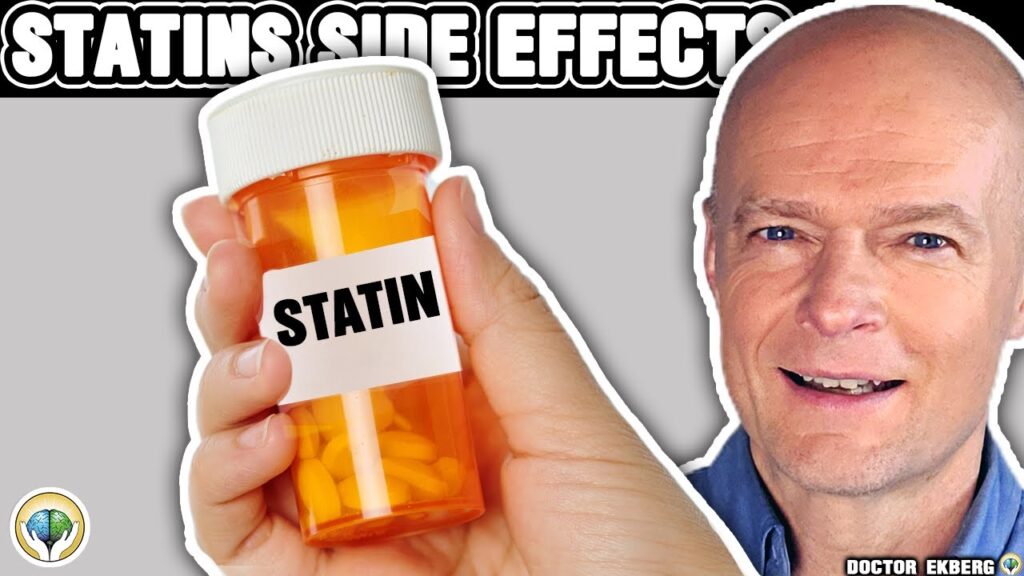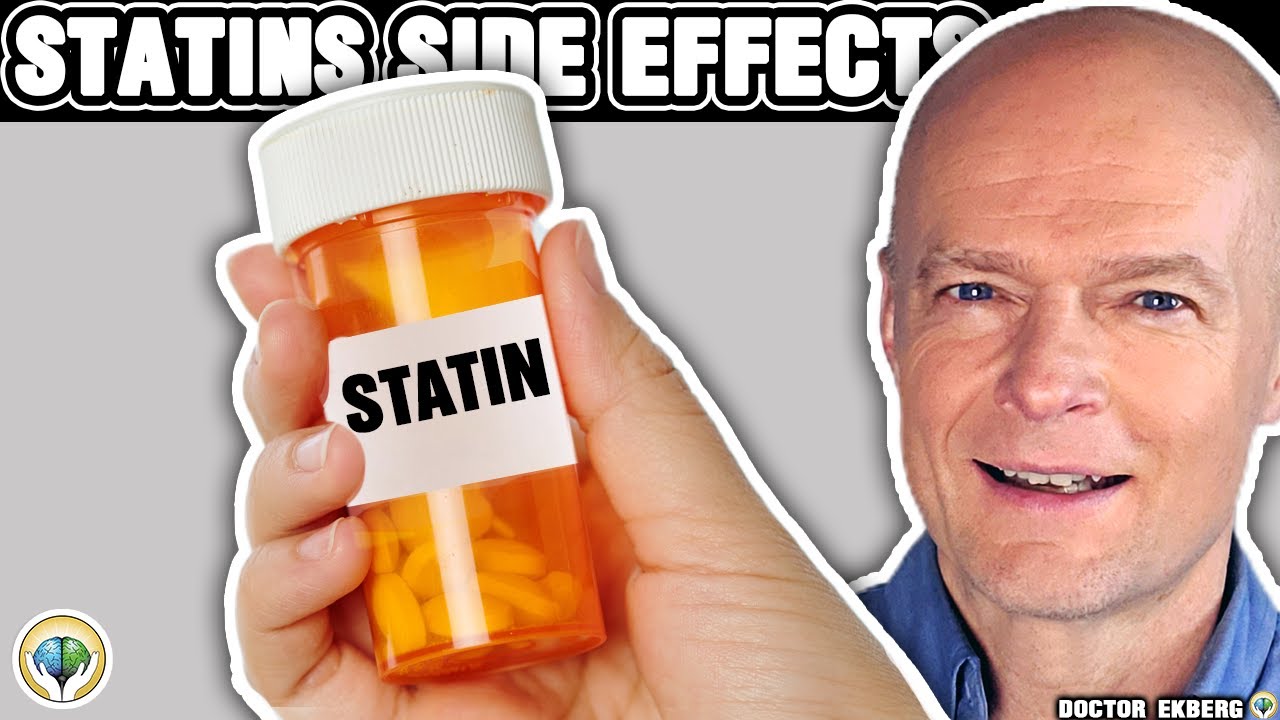When it comes to the dangers of statins and their side effects, it’s important to consider natural alternatives. Understanding the reasons behind high cholesterol can lead to realizing that statin medications may not be necessary. By learning about natural ways to control cholesterol levels, you can potentially avoid the risks associated with statin drugs. Dr. Sten Ekberg discusses the potential side effects of statin medications, such as liver and muscle damage, in his informative video. Understanding the impact of disrupting the body’s natural processes, like cholesterol and CoQ10 production, can help you make informed decisions about your health. Take the time to educate yourself and make choices that support your overall well-being.

Overview of Statins
Statins are a class of medications commonly prescribed to lower cholesterol levels in the blood. They work by blocking the enzyme in the liver responsible for producing cholesterol. By reducing cholesterol levels, statins help lower the risk of heart disease, heart attacks, and strokes.
What are statins?
Statins are drugs that inhibit the enzyme HMG-CoA reductase, which plays a key role in the production of cholesterol in the liver. By reducing cholesterol synthesis, statins help lower LDL (bad) cholesterol and triglycerides while increasing HDL (good) cholesterol levels.
How do statins work?
Statins work by blocking the enzyme HMG-CoA reductase, which is involved in the production of cholesterol in the liver. By inhibiting this enzyme, statins reduce the amount of cholesterol produced in the body, leading to decreased cholesterol levels in the blood.
Commonly prescribed statins
Common statins include atorvastatin (Lipitor), simvastatin (Zocor), rosuvastatin (Crestor), and pravastatin (Pravachol). These medications are often prescribed to individuals with high cholesterol levels to help reduce their risk of cardiovascular events.
Side Effects of Statins
While statins are generally safe and well-tolerated, they can also cause side effects in some individuals. It’s essential to be aware of these potential side effects and monitor your health while taking statins.
Liver damage
Statins can occasionally cause liver damage, as they affect liver enzymes involved in cholesterol production. It is essential to have regular liver function tests while taking statins to monitor for any signs of liver damage.
Muscle damage
Some people may experience muscle pain, weakness, or even muscle breakdown (rhabdomyolysis) while taking statins. It is crucial to report any muscle symptoms to your healthcare provider promptly.
Memory and concentration issues
In rare cases, statins may affect cognitive function, leading to memory problems or difficulty concentrating. If you experience cognitive changes while taking statins, speak to your doctor.
Depression
There have been reports of depression and mood changes in individuals taking statins. If you notice changes in your mood or mental health while on statins, it’s essential to discuss this with your healthcare provider.
Pain and neuropathy
Some individuals may experience nerve pain (neuropathy) while taking statins. If you develop any pain or tingling sensations in your extremities, it’s important to seek medical advice.
Sleep problems
Statins have been linked to sleep disturbances, such as insomnia or vivid dreams, in some individuals. If you have trouble sleeping while taking statins, talk to your doctor.
Sexual dysfunction
In some cases, statins may cause sexual side effects, such as erectile dysfunction or a decrease in libido. If you experience any sexual problems while on statins, discuss this with your healthcare provider.
Fatigue
Fatigue and weakness are potential side effects of statin use. If you feel excessively tired or weak while taking statins, it’s essential to bring this to the attention of your healthcare provider.
Mechanism of Statin Side Effects
The side effects of statins are primarily attributed to their impact on Coenzyme Q10 (CoQ10) production and interference with cholesterol synthesis. CoQ10 is an essential enzyme for energy production in the mitochondria, particularly in organs with high energy demands like the liver, heart, and brain.
Impact on CoQ10 production
Statins inhibit the enzyme responsible for synthesizing both cholesterol and CoQ10. By blocking this enzyme, statins reduce CoQ10 levels, leading to potential energy production deficits in vital organs like the heart and brain.
Effects on cholesterol synthesis
Statins interfere with the mevalonate pathway, a biochemical process involved in cholesterol production. By disrupting this pathway, statins lower cholesterol levels in the blood, but they may also impact other essential functions that rely on cholesterol as a precursor.
Importance of cholesterol for the body
Cholesterol is a crucial substance necessary for various bodily functions, including hormone production, cell structure, and nerve function. While high levels of LDL cholesterol can increase cardiovascular risk, cholesterol is vital for overall health and should not be excessively reduced.
Symptoms to Watch For
It is important to monitor your health while taking statins and be aware of any symptoms that may indicate side effects or adverse reactions. Knowing when to seek medical advice is crucial to ensure your well-being.
Monitoring your health while taking statins
Regular check-ups, blood tests, and monitoring of symptoms can help you track your health while on statins. Keep a record of any new or worsening symptoms and discuss them with your healthcare provider.
Knowing when to seek medical advice
If you experience severe muscle pain, weakness, jaundice (yellowing of the skin), cognitive changes, or any other concerning symptoms while taking statins, seek medical attention promptly. Do not ignore persistent or severe side effects.
Natural Alternatives to Statins
While statins are effective in lowering cholesterol, some people may prefer natural alternatives or complementary approaches to managing their cholesterol levels. Lifestyle and dietary changes, as well as certain herbal supplements, can support heart health without the side effects of statins.
Dietary changes for cholesterol control
Adopting a heart-healthy diet rich in fruits, vegetables, whole grains, and lean proteins can help lower cholesterol levels naturally. Limiting saturated fats, trans fats, and refined sugars can also support heart health.
Lifestyle modifications for heart health
Regular exercise, stress management, adequate sleep, and smoking cessation are essential lifestyle factors for maintaining heart health. These habits can complement dietary changes and support overall well-being.
Herbal supplements for cholesterol management
Certain herbal supplements like red yeast rice, garlic, and plant sterols have been studied for their cholesterol-lowering properties. While these supplements may offer some benefits, it is essential to consult with a healthcare provider before adding them to your regimen.
Long-Term Risks of Statin Use
While statins can be beneficial in reducing cardiovascular risk, long-term use may pose certain risks and considerations. Understanding the relationship between statins and other health conditions is essential for informed decision-making.
Relationship between statins and other health conditions
Statins may be associated with an increased risk of diabetes, muscle damage, cognitive impairment, and liver problems in some individuals. It is crucial to weigh the benefits of statin therapy against these potential risks.
Potential harm of prolonged statin use
Prolonged statin use has been linked to an increased risk of muscle side effects, liver abnormalities, and nutrient deficiencies. Regular monitoring and open communication with your healthcare provider are essential for managing these risks.
Consulting with Healthcare Providers
If you have concerns or questions about statins or their side effects, it is important to speak with your healthcare provider. Discussing your health goals, symptoms, and preferences with your doctor can help tailor a treatment plan that meets your needs.
Discussing concerns with your doctor
Openly communicate with your doctor about any side effects, symptoms, or changes you experience while taking statins. Your doctor can provide guidance, adjust your medication if needed, or explore alternative treatment options.
Exploring alternative treatment options
If you are hesitant about statin therapy or experience intolerable side effects, ask your healthcare provider about alternative treatment options. Together, you can explore different approaches to managing cholesterol and heart health.
Educating Yourself on Medications
Understanding the risks and benefits of statins is essential for making informed decisions about your health. Researching potential side effects, mechanisms of action, and alternatives can empower you to take an active role in your healthcare.
Understanding the risks and benefits of statins
Educate yourself about how statins work, their potential side effects, and the benefits they offer in reducing cardiovascular risk. Knowing both the advantages and drawbacks of statin therapy can help you make informed choices.
Researching potential side effects
Stay informed about the possible side effects of statins, such as liver damage, muscle pain, cognitive changes, and fatigue. Recognizing these side effects early and discussing them with your healthcare provider can lead to better outcomes.
Importance of Lifestyle Changes
Lifestyle plays a critical role in heart health, cholesterol management, and overall well-being. Embracing healthy habits like a balanced diet, regular exercise, stress reduction, and adequate sleep can support heart health without relying solely on medications.
The impact of diet and exercise on health outcomes
Healthy eating habits and regular physical activity can improve cardiovascular health, lower cholesterol levels, and reduce the risk of heart disease. Lifestyle modifications are key components of a holistic approach to managing heart health.
Promoting overall well-being through healthy habits
Incorporating healthy habits into your daily routine, such as mindfulness practices, social connections, and hobbies, can enhance your overall well-being. Balance in physical, emotional, and mental health is essential for a healthy lifestyle.
Conclusion
In conclusion, being informed about statins and their potential side effects is crucial for making decisions about your health. While statins are effective in reducing cholesterol and lowering cardiovascular risk, they may also pose risks and side effects that need to be considered.
Emphasizing the importance of informed decision-making regarding statin use
Take an active role in your health by educating yourself about statins, their mechanisms of action, and potential side effects. Discuss your concerns and preferences with your healthcare provider to make informed decisions about statin therapy.
Encouraging holistic approaches to cholesterol management
In addition to medications like statins, prioritize lifestyle changes, dietary modifications, and alternative therapies for managing cholesterol and heart health. A holistic approach that considers all aspects of well-being can help you achieve optimal cardiovascular health.
By being proactive in your health management, staying informed, and working collaboratively with your healthcare provider, you can make choices that support your heart health and overall well-being. Remember that there are alternatives to statins, and personalized treatment plans can be tailored to meet your specific health needs.
